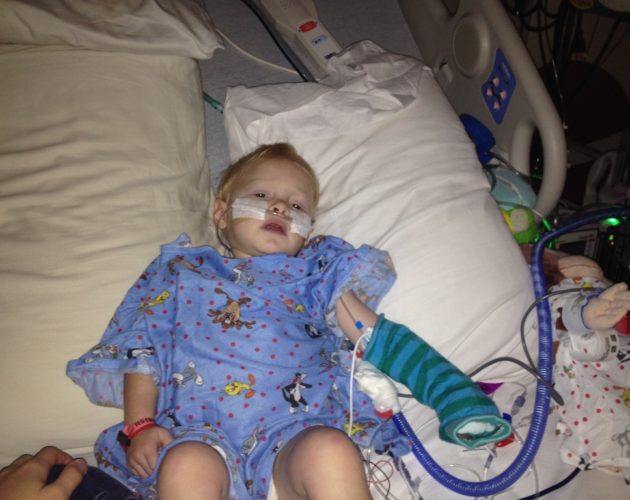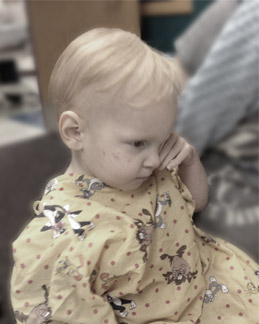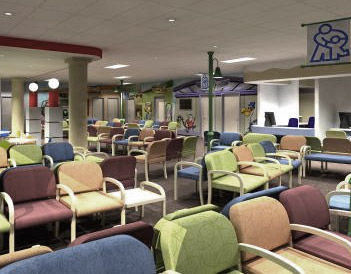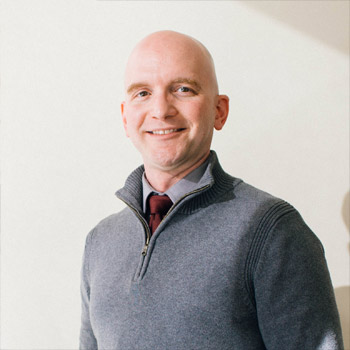
“The Tumor Was Not Resectable.”
There's no comfort in the waiting room; just nervous pacers bracing for bad news.
This post is part three in an ongoing series of posts about my son Jude and his fight with cancer.
Part 1 – The Day You Find Out Your Child Has Cancer
Part 2 – A Goliath Named Neuroblastoma
Part 3 – “The Tumor Was Not Resectable.”
 It was a moment nightmares are made of to find myself standing with my 8½ months pregnant wife alone outside the surgical unit of the hospital. A nurse had just come and taken our whimpering 2-year-old son away from us and disappeared behind a large heavy door into a brightly lit, sterile room. Less than a week earlier, we had been delivered the devastating news that our firstborn child had stage 3-4 cancer, a neuroblastoma tumor that had gone undetected in his abdomen for the last year. In a whirlwind of events, our son Jude was admitted into the hospital, placed in a room on the cancer floor, had huge amounts of fluids pumped into his arms and legs through an IV machine, and subjected to frightening blood draws every four hours. My wife and I had been by his side every second of the day since his diagnosis. And now, we had just handed our sick little boy off to a complete stranger, who was going to wheel him into a room where we were not allowed to follow, inject him with a cocktail of pharmaceuticals until his body was limp, and then take a blade and cut his stomach wide open. Had I known how close my son would come to death in the next few hours, I don’t think I could have ever allowed the surgery to take place. You never get to plan for events like this, but it’s not as if a little advance notice will make it any easier.
It was a moment nightmares are made of to find myself standing with my 8½ months pregnant wife alone outside the surgical unit of the hospital. A nurse had just come and taken our whimpering 2-year-old son away from us and disappeared behind a large heavy door into a brightly lit, sterile room. Less than a week earlier, we had been delivered the devastating news that our firstborn child had stage 3-4 cancer, a neuroblastoma tumor that had gone undetected in his abdomen for the last year. In a whirlwind of events, our son Jude was admitted into the hospital, placed in a room on the cancer floor, had huge amounts of fluids pumped into his arms and legs through an IV machine, and subjected to frightening blood draws every four hours. My wife and I had been by his side every second of the day since his diagnosis. And now, we had just handed our sick little boy off to a complete stranger, who was going to wheel him into a room where we were not allowed to follow, inject him with a cocktail of pharmaceuticals until his body was limp, and then take a blade and cut his stomach wide open. Had I known how close my son would come to death in the next few hours, I don’t think I could have ever allowed the surgery to take place. You never get to plan for events like this, but it’s not as if a little advance notice will make it any easier.
A social worker soon appeared to lead us from the surgical unit to the waiting area. My wife Ashlie and I stood just around the corner from the door that led into the large windowed Surgery Waiting Room, wiping our tears away, trying to gain composure and lose the redness in our eyes. After a few deep breaths, we entered the room where our family was gathered, and waited.
Ben Gibbard describes hospital waiting rooms very bluntly in his song “What Sarah Said“:
“Amongst the vending machines and year-old magazines in a place where we only say goodbye / […] / I looked around at all the eyes on the ground as the TV entertained itself / because there’s no comfort in the waiting room / just nervous pacers bracing for bad news.”
The hours tick by very slowly in these rooms. You try to do things to occupy your time, nervously thumb through magazines and watching the silent television high on the wall, but your mind refuses to focus on these activities. Instead, uncertainties and questions race through your head. “What’s happening? Why is it taking so long? The doctor should have given us an update by now…” Our extended family, our parents and siblings and grandparents sat with us, trying to be supportive and optimistic, attempting to be cheerful, but the pallor of uncertainty and dread hung thick in the air.
The surgery was originally scheduled to only last an hour or so. The goal of this operation was to examine the tumor directly, and to biopsy a tiny portion of the tumor. The doctors needed to get a complete pathology on this particular cancer. Despite all the advances in modern medical science and imaging technology, some things just need to be examined directly. We were informed of a very slight chance of attempting to resect (remove) the tumor during this surgery. We were cautioned time and again however that the possibility of doing a complete resection was rare. Often, neuroblastoma tumors grow and wrap around other organs and blood vessels, making their removal extremely difficult and risky.
My aunt came by with her two daughters at some point bringing lunch for everyone. I remember trying to eat something, mostly as a show of my appreciation for her bringing food for the whole family, but I had no appetite. Food tasted bland and unappealing. I just wanted to get my son back, to hold him close and hear his laugh and see him smile as he asked for his toys.
 After an hour, Ashlie and I heard our names being called over the intercom. We hurriedly made our way to the reception desk, where the lady seated behind the desk directed us to a small room with a telephone. A nurse inside the surgical unit was on the other end. There wasn’t much information she could share with us, except that the surgery was still progressing and she would try to call again soon and give us more information.
After an hour, Ashlie and I heard our names being called over the intercom. We hurriedly made our way to the reception desk, where the lady seated behind the desk directed us to a small room with a telephone. A nurse inside the surgical unit was on the other end. There wasn’t much information she could share with us, except that the surgery was still progressing and she would try to call again soon and give us more information.
The minute hand of the clock made a full circle once, then twice, and then a third and fourth time. Each hour, we would hear our name called and hurry to the small room to receive a telephone update. We were glad to be receiving updates, but also apprehensive of why the surgery was taking so much longer than originally scheduled. The nurse communicated that the surgical team was still examining and attempting to remove the tumor, but that they could decide to abandon the resection attempt at anytime and close our son up.
In the fourth hour, we received another call from the nurse. Her voice was notably more animated this time, and she quickly informed us that the tumor had been removed! This was the happiest news we could have heard, and something we really hadn’t expected. We didn’t want to get our hopes up, only to be disappointed, so we had put the idea of resection out of our heads and assumed this would be merely an exploratory surgery. Suddenly, everything had changed! Our tears were of joy, not sorrow. Our smiles were honest and authentic for the first time in a long time.
The nurse was quick to advise us that our son was not out of the woods yet though. The resulting bleeding from the surgery was not under control, and he had lost a great deal of blood. Over the next hour we would learn that the bleeding still had not been stopped and he was receiving blood transfusions. The cancer had grown and intertwined with Jude’s hepatic artery, the main vessel that supplies blood to the liver, the pancreas, the kidneys, and portions of the bowel and stomach. During the surgery, when the cancer was slowly being removed, this important artery was severed without the surgical team knowing it. Without blood flowing to these organs, they can quickly fail and die.
“I made a mistake. The tumor was not resectable.”Finally, after hours and hours of waiting, we were once again called to the small room with the telephone. We entered and sat down, and waited for the phone to ring. But the phone remained silent. Several tense minutes passed, when suddenly the door opened and the surgeon, still dressed in his sweat-soaked surgical scrubs and cap, walked into the room. He literally collapsed into a chair in the room, exhausted, looking as though he had just run a marathon.
The first words out of his mouth were some of the most terrifying I’ve ever heard: “I made a mistake.”
What had happened? What mistake? Where is my little boy right now? What is going on? Thousands of questions race through your head in an instant, each more ominous and frightening.
The surgeon continued: “I made a mistake. If I had known how intertwined and twisted the cancer was inside his body, I would have never attempted to remove it. The tumor was not resectable. But once we began attempting to remove it, we realized that we had gone too far and could not turn back. We had to continue. I am not capable of removing that tumor. But somehow, we got it out!”
Jude’s surgeon explained that he had gotten to a point where it the bleeding was too bad to stop the surgery. He had to continue, or Jude would likely die. He would spend several hours in an exhausting marathon surgery, eventually with the help of a liver transplant surgeon, removing the tumor and trying to reattach the hepatic artery to the splenic artery in order to preserve blood flow to the liver and kidneys. Jude would receive more than four blood transfusions during this procedure. But finally, miraculously, the surgeons were able to slow the bleeding and had fashioned a new hepatic artery from other healthy blood vessels in Jude’s body. There was no guarantee this new artery would work, but he had done all he could do. The doctor put his scalpel down and began to sew my son’s stomach closed.
Against all odds, the surgical team had indeed performed a miracle. They removed an incredibly intricate tumor in a very small body, one that was already weakened and malnourished from the demon that had invaded it. In hindsight, the wisest plan would have been to undergo several months of chemotherapy and radiation treatments in an attempt to weaken the cancer and reduce the size of it, and only then undergo surgery. But the surgical team did not have the privilege of foreknowledge, and instead had to proceed with the little information that was available. The surgeon would later tell us that he felt as though he was watching his hands move, as if an outside force was guiding them through the procedure and he was just mere witness to the event. If ever there was a story that made you believe in a higher power, this was it.
With tears of joy we returned to the waiting room to inform our family of this wonderful news. They celebrated with us, a collective sigh of relief settling over our group. We gave thanks to the Lord for guiding the surgeons hands and removing that awful tumor, and prayed for healing and recovery for our son.
It would still be another excruciating hour or two before Jude was stabilized enough for us to go into the Intensive Care Unit and see him. And when I was finally allowed into this highly restricted area and able to visit my son, what I found left me feeling more broken and hollow than I had ever felt before.
To be continued…
 >
>